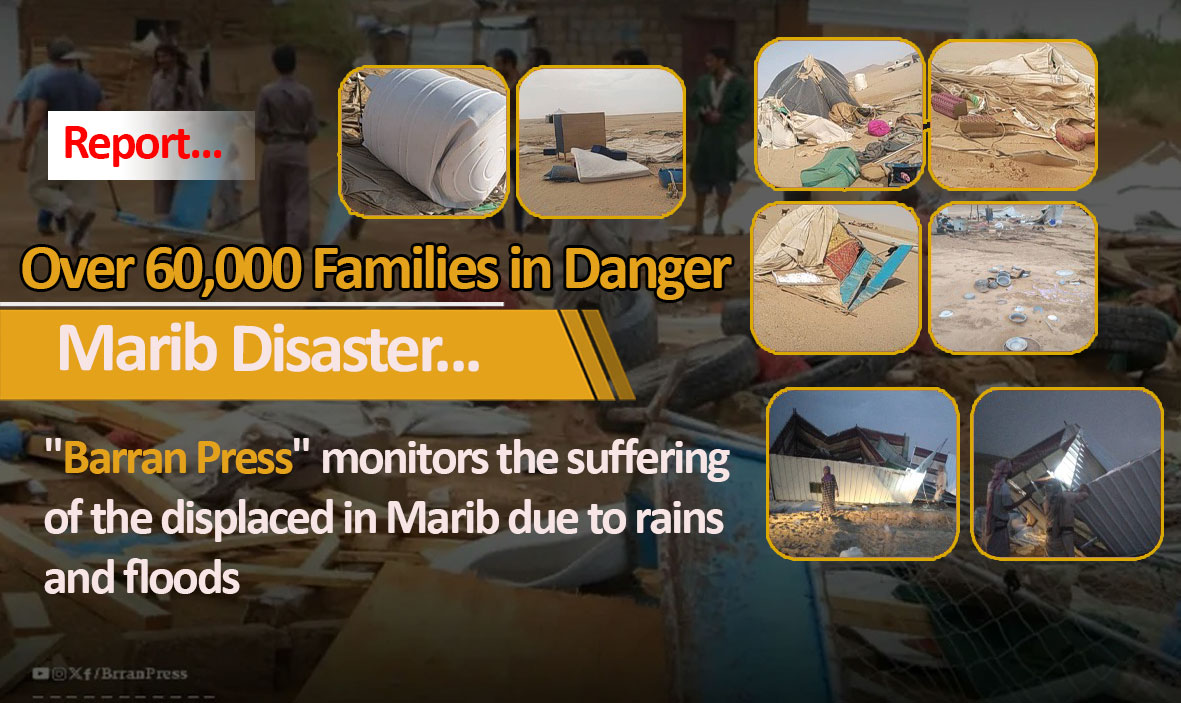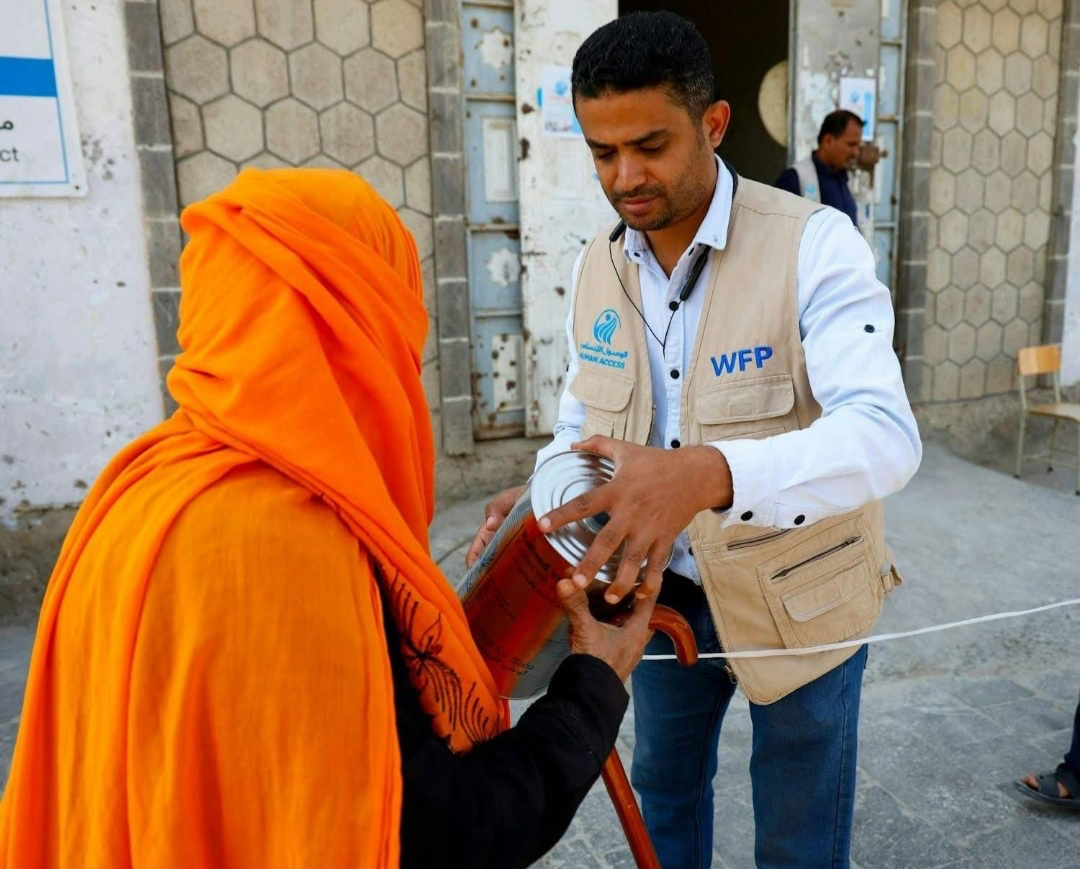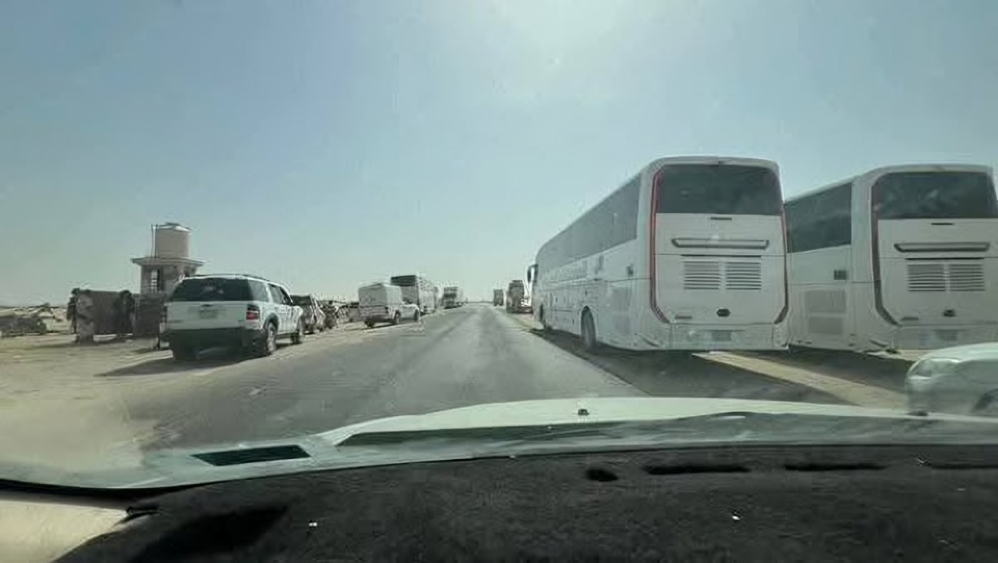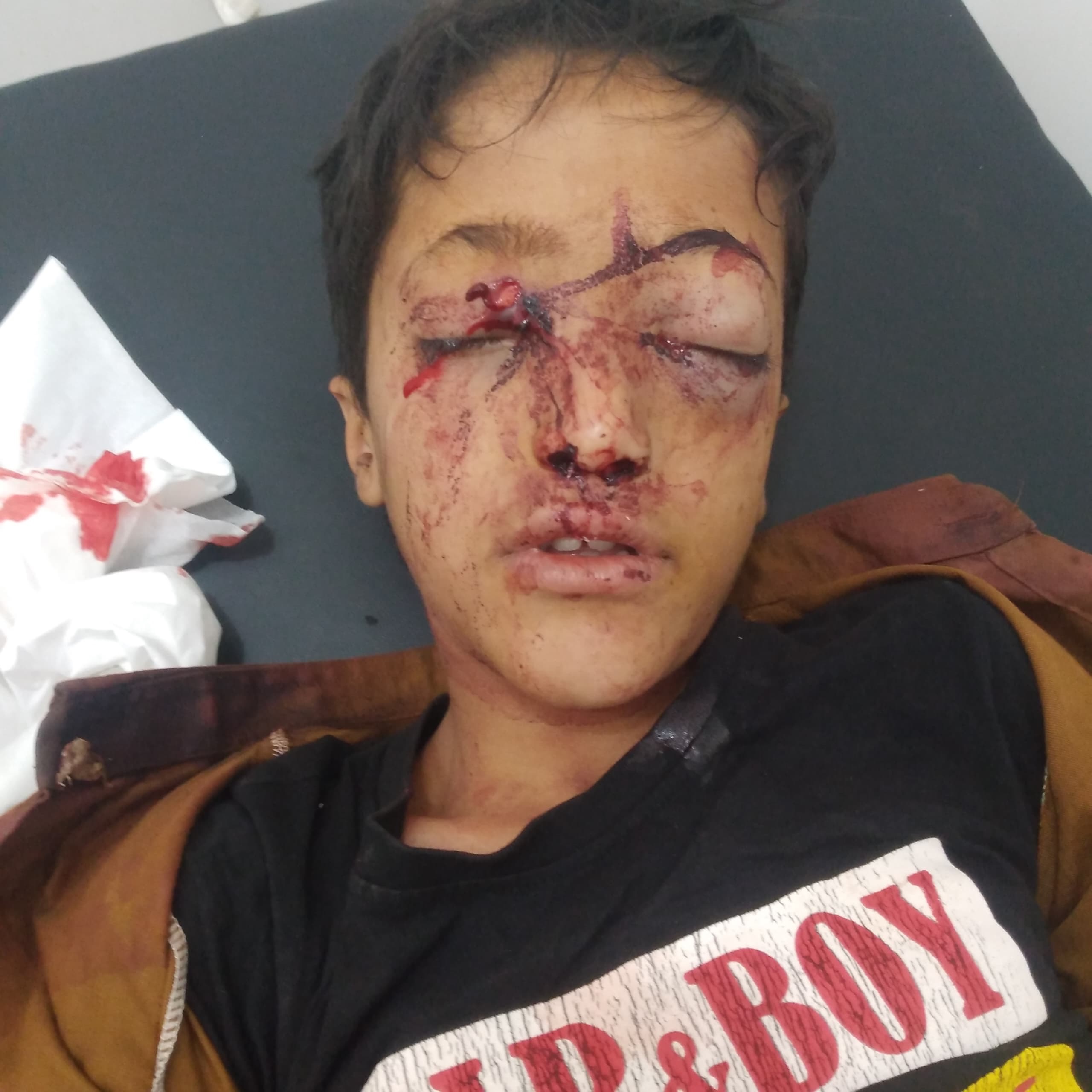
Barran Press
For the second consecutive week, Marib Governorate, home to over 70% of Yemen's internally displaced persons (IDPs), has been battered by heavy rains, severe thunderstorms, and occasional wind and hailstorms. The extreme weather has resulted in civilian casualties and significant damage to public and private property, including service facilities and homes.
Barran Press correspondent visited several IDP camps in Marib city and the neighboring Wadi district, documenting the plight of families affected by the recent storms. The report captures the hardships faced by these vulnerable communities.
According to the Marib Executive Unit's 2023 annual report, 63,623 displaced families, comprising 458,085 individuals, reside in 204 camps and displacement sites across Marib. These figures represent a significant portion of the total 2,134,497 IDPs in the governorate.
On the Brink of Disaster
Barran Press correspondent observed that all the camps have sustained varying degrees of damage. The most vulnerable shelters, constructed from tarpaulin, netting, and makeshift materials, have been particularly affected by the heavy rains and strong winds.
IDP shelters in Marib are categorized as "emergency shelters" (wooden and tarpaulin structures designed for 3-6 months of use), "temporary shelters" (iron netting, tarpaulin, or makeshift shelters using local materials), and "transitional shelters" (caravans intended for use from 6 months to two years). However, a large majority of these shelters are dilapidated, with multiple families often sharing a single tent, according to the International Organization for Migration's (IOM) monthly response report (January 2022).
The Executive Unit's report reveals that 142 camps are at risk of disaster, with 30 threatened by floods and 112 facing danger from wind and storms. Furthermore, only 93 camps are managed by the Camp Coordination and Camp Management (CCCM) cluster, while the rest remain unmanaged, exacerbating the suffering of IDPs due to inadequate humanitarian and relief interventions.
A Pool of Water
"Umm Abdulrahman," a woman in her forties residing in the "Al-Jafina" IDP camp, the largest displacement camp in Marib and Yemen, described how heavy rains flooded her home, rendering access impossible.
"The camp has transformed into a pool of water, and movement has completely ceased due to the floods and rain," said Umm Abdulrahman, a mother of four, in her interview with Barran Press.
She added that her home's wall had cracked and was on the verge of collapsing on her and her children. Furthermore, lightning strikes had caused power outages.
The report highlights the urgent need for immediate humanitarian assistance to address the critical situation facing IDPs in Marib. The ongoing heavy rains and floods pose a significant threat to their lives and well-being, demanding a swift and coordinated response from humanitarian organizations and authorities.
Casualties and Damage
Heavy rains that lashed Marib last Sunday (August 11th) tragically resulted in the deaths of at least four people and injuries to ten others among the displaced population. A total of 7,179 displaced families have been affected by the rains and floods.
According to the Marib Executive Unit for the Management of IDP Camps (governmental), the shelters of 2,973 displaced families were completely destroyed, while 4,206 shelters suffered partial damage in various camps. Umm Abdulrahman's family is among those whose home sustained partial damage.
The Executive Unit reported that 41 camps across the governorate's districts were affected by the rains and floods, including camps like "Al-Suwayda" and the "Al-Rawik" area, located 95 km east of Marib city.
Fears and Risks
Expressing her concern for her family and other displaced individuals in the camp, Umm Abdulrahman highlighted the dangers posed by water accumulation in pathways and around shelters. She pointed out that some areas contain water-filled pits, creating a hazard for pedestrians, especially children.
She recounted a tragic incident where a 10-year-old girl fell into a sewage pit filled with rainwater near her home and was tragically found dead.
Umm Abdulrahman also voiced concerns about the potential for a health crisis due to stagnant rainwater, particularly given recent reports of cholera outbreaks.
She urged local authorities, organizations, and agencies to swiftly intervene to rescue the displaced population and restore electricity, which she said had been disrupted in some areas due to lightning strikes.
Continuous Rains and Damage
A Barran Press correspondent spoke with several displaced individuals on Friday morning, who described their struggles amidst the ongoing rainfall.
Displaced people in the eastern and northern outskirts of Marib reported that the previous day's rain lasted for approximately six hours, causing significant damage to their shelters, many of which are made of tents, tarpaulin, and straw.
Over 5,000 displaced families from Al Jawf Governorate reside in displacement camps in the desert region of "Al-Rawik." Images depict the severe damage inflicted on their tents and belongings, including food, shelter, and other essential items.
Reports indicate that the "Al-Rubwa" camp, located in old Marib city, is among the affected displacement camps. Other damaged camps include those in sectors one and three, such as the "Al-Sema" camp and the "Jaw Al-Naseem" camp, where injuries have been reported due to the rains.
Deadly Lightning Strikes and Families Without Shelter
Ibrahim Al-Abbasi, a displaced individual residing in the "Al-Suwayda" camp, told Barran Press that the heavy rains caused significant damage to tents and containers in the camp. He explained that floods swept away tents and containers, along with their contents, adding to the suffering of many displaced families who are now left without shelter or food.
According to Ibrahim, lightning strikes resulted in the deaths and injuries of some displaced individuals in the camp and also led to the burning of several tents. He emphasized that "most of the displaced families are now in the open without shelter."
Ibrahim also highlighted the disruption of electricity due to lightning strikes, calling on authorities and relevant entities to swiftly intervene by providing shelter and opening roads blocked by rains and floods.
Asma'a Abdullah, another displaced individual in the same camp, said that the heavy rains washed away the tent she was living in, which included a kitchen. The floods swept away all the utensils and food supplies inside.
Asma'a described the fear and panic experienced by her child due to lightning strikes, stating that he lost consciousness. She explained that due to the waterlogged pathways, she was unable to take him to the hospital until the following day. She added that she took him to the hospital the next morning and his condition is now stable.
Like other displaced individuals who spoke to Barran Press, Asma'a appealed to humanitarian and relief organizations to intervene urgently, compensate the displaced for their losses, and find immediate solutions for the stagnant water to protect children and prevent the spread of epidemics and diseases within the camp.
Fear and Suffering
"Barran Press" met with displaced resident Ahmed Abdullah in a camp in Wadi district. Abdullah reported that the rains and storms had washed away and destroyed his water tank. He described the fear and panic experienced by IDPs in the camp as electricity outages persisted amid the relentless rain, storms, and winds.
"The continued weather disturbances, rain, and lightning pose a threat to the lives of all displaced persons, especially since most of their homes are just tents," Abdullah said.
He added that the rains and storms exacerbate the suffering, leading to power outages. With the heat during the day, the situation becomes even more difficult, sometimes causing illnesses. Abdullah urged authorities to intervene quickly to assist those affected.
Seeking Lasting Solutions
Displaced resident Aaya Abdullah highlighted the ongoing climate change, stating that "all predictions point to continued climate change and upcoming waves, meaning the suffering will continue and could affect all camps and most displaced persons."
She emphasized the need to address the damage caused by the rains and thunderstorms, including power outages, destruction of homes and tents, and loss of life. Abdullah called for the government to provide support to all victims and compensate those who have suffered losses.
She also urged authorities to find lasting solutions to the recurring problem, as the suffering repeats itself every year during the rainy season without any solutions. These solutions should come after immediate interventions to provide relief to those affected.
Urgent Call for Assistance
Last Wednesday, Marib Governorate Deputy, and head of the Emergency Committee, Abd Rabbuh Muftah, called on all local, regional, and international organizations to intervene and provide immediate assistance to meet the needs of those affected by the natural disasters plaguing the governorate.
Muftah confirmed that the heavy thunderstorms and strong winds that have been affecting Marib since last Sunday morning have so far resulted in the deaths of eight people and injuries to 36 others, including women, mostly displaced persons.
He reviewed the damage and losses caused by the rains and floods in IDP camps and service sectors, particularly the electricity sector. This comes amidst predictions that Marib will continue to be affected by the low-pressure system and experience continued heavy thunderstorms in the coming days.
The head of the Emergency Committee highlighted the "large gap between the limited level of partner interventions and the needs of over 7,300 families affected by the rains and thunderstorms."
He appealed to all citizens residing in valleys or near flood channels and passages to move away from these areas to protect their lives and property. He noted that continuous warnings from weather forecasting centers indicate that Marib will continue to be affected by the low-pressure system.





